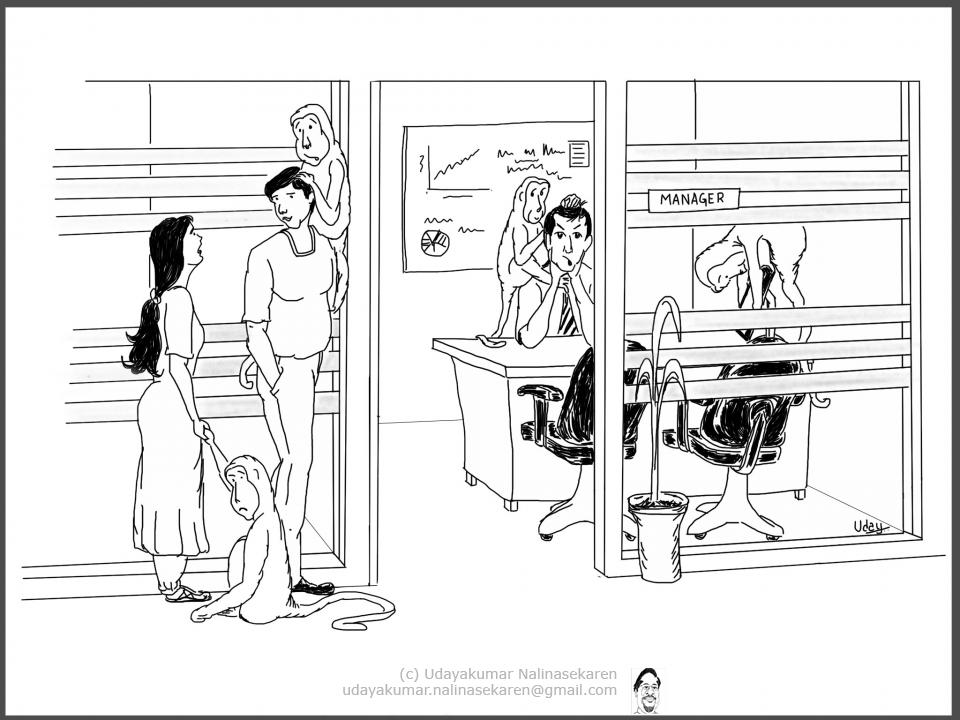Leadership

QoTD
Fending monkeys is a leader's key competence
Udayakumar Nalinasekaren
Aug 30, 2014
If you do not develop this competence, you will soon find that you are doing the work of your sub-ordinates. Eventually, your smart sub-ordinate may end up supervising you without you even realising it. Many team leaders who have not developed this competence find themselves feeling that they are carrying the load of their team and do not have the time to focus on their own priorities/results. I have observed that some leaders feel proud of solving their team member’s problems. This helps them establish their superiority. The realisation of their mistake usually comes a little too late in the game. In some cases, leaders do it because they feel threatened of losing their position to their sub-ordinates and hence do not want to develop them.
The role of a leader is to set direction, identify goals, assign work and monitor progress in that order. In-flight, the leader is also expected to counsel, mentor or coach based on what the situation warrants. Some sub-ordinates could land up in problems or hurdles that prevent timely achievement of desired results. They will also casually report their current hurdle to the leader and seek help.
It is possible that the leader is an expert and knows how to solve the problem like the back of his/her hand. As already observed, some leaders want to advertise their proficiency to the world and quickly grab the opportunity.
Let us say you are walking to an important meeting. Your team member meets you in the hallway and says “Boss.. I have a problem with the project work I am required to complete this week” and explains the problem quickly. You tell your sub-ordinate “I will think about it and get back to you”. Voila! your sub-ordinate has successfully transferred his/her monkey to your shoulder. Soon you might get a follow-up mail from your sub-ordinate on how far you have progressed in thinking about the problem, if a solution been found, etc., He/she may also politely ask when is a good time to check back with you again. All these are supervisor actions and your sub-ordinate has now assumed the role of supervising you. You are being followed up on a task you are required to perform for him/her. Alternatively, your sub-ordinate can attach a dependency on your solution to the timely achievement of his/her results.
From a recent article I read in Harvard Business Review, there are five choices of initiative levels your employees have in handling on-the-job problems. The levels are:
-
Wait until told what to do
-
Ask what to do
-
Recommend an action, and implement it with your approval
-
Independently take action to solve the problem and keep you informed at the same time
-
Independently take action and update you using a mutually agreed procedure
When your sub-ordinate brings a problem to you, do not take too much time to discuss the problem. Promptly outlaw the use of level 1 or level 2. Agree on one of a level 3 , 4 or 5 initiative and outcome from the employee before you close.
Your sub-ordinates will tend to remain at initiative levels 1 or 2 when they lack energy, knowledge or enthusiasm to solve a problem at hand. If you help them to stay at these levels, you effectively stump them from developing problem solving skills and elevating themselves to higher initiative levels. You might end up becoming their false foundation. When you are removed from their equation, they become nothing. This leads eventually to a lose-lose situation for all stakeholders including you.
You can read the full article from HBR here.
My Artwork
Coming soon...Latest Blog Posts
Coming Soon
Archives
Search




